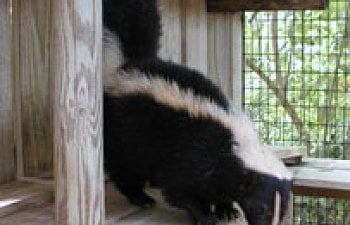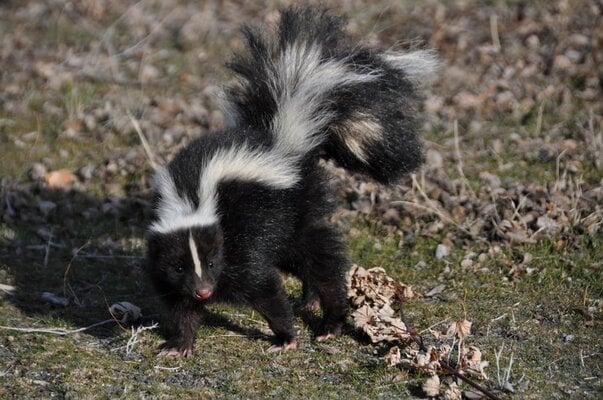General Information and Description
Skunks (also known as polecats in the USA) are medium-sized mammals, probably best known for their ability to spray a liquid with a strong, unpleasant odor. There are four species of skunks: the hooded skunk, the striped skunk, the spotted skunk, and the scarce hog-nosed skunk. The most common of the four being the striped skunk. Skunks' eyes and ears are small and though their vision is bad, they have a keen sense of hearing. Skunks are members of the weasel family and spotted skunks look similar to weasels because they are much smaller and have narrower faces than the other skunk species.
Adult skunks measure around 2 feet long, including a 7-10 inch tail. They weigh between 3 and 12 pounds, depending on age, sex, physical condition, and season. Males on average are 15% larger and heavier than females. Although the most common fur color is black and white, some skunks are brown or grey and a few are cream-colored. All skunks are striped, even from birth. They may have a single black stripe across their backs and tails and two thinner stripes, or (in the case of the spotted skunk) a series of white spots and broken stripes. Some also have stripes on their legs.
Range
Skunks are widespread in the United States and can also be found in southern Canada and northern Mexico. They are found in a wide variety of habitats including woodlands, grasslands, and agricultural lands and are very common in urban areas. Both the spotted and the striped skunk can be found across the Great Plains.
Method of Kill
Skunks are mostly nocturnal and begin their search for prey at dusk. At sunrise, it will retire to its den, which may be a ground burrow, beneath a building, or a rock pile. If skunks gain access to your chicken coop, they will normally feed on the eggs and may hurt or kill your chickens.
It is common for skunks to kill and eat young chickens with their eggs, but they rarely hurt or eat adults. Skunks, however, are opportunistic predators and will take advantage of any opportunity that comes their way. Like any predator, skunks opt for young birds and eggs because they are comparatively defenseless.
Furthermore, it is not uncommon for skunks to eat small breeds of chickens as well. Therefore, it depends on a few factors, such as the flock, their age, and the flock's size. Although chickens can be tough, some wild animals will still follow their instincts and kill chickens. It is the skunk's habit to bite the birds head and neck when going for the kill. After that, they tear out their throats and necks. The bird will die immediately, and from that point on, they can eat as much as they want. So if you wake up one day to find feathers and entrails/intestines in your coop, a skunk might be the culprit.
Prevention and Treatment
To protect your backyard flocks from skunks ensure they are kept in secure coops and runs with proper fencing. Small chicks should be kept in a secure brooder. Skunks are normally not inclined to break through fences but will try to gain access through any weak spots and loose places in fences and buildings. Skunks are excellent diggers and may try to gain entry by digging under fences. Skunks are attracted by food, water, and shelter, so don't leave any pet food (such as cat food), windfalls under trees, or any other feeds outside overnight that may attract them.
Also, make sure to lock away your trash or garbage cans. Place paving slabs around the perimeter of the coop and run or bury a few inches of hardware cloth or welded wire (not chicken wire) along the bottom of fences to stop them from digging their way in. If you have an existing skunk problem or suspect you may have one visiting you can set a live bait trap.
A guard dog can also be used to deter raccoons and skunks from coming near your chicken coop.
For more information and discussions on skunks and how to protect your flock from them, see the Predators and Pests section on the forum.
Other common chicken predators discussed in this section include foxes, coyotes, opossums, bobcats, minks, snakes, rats, hawks, owls (and other birds of prey), and many more!


